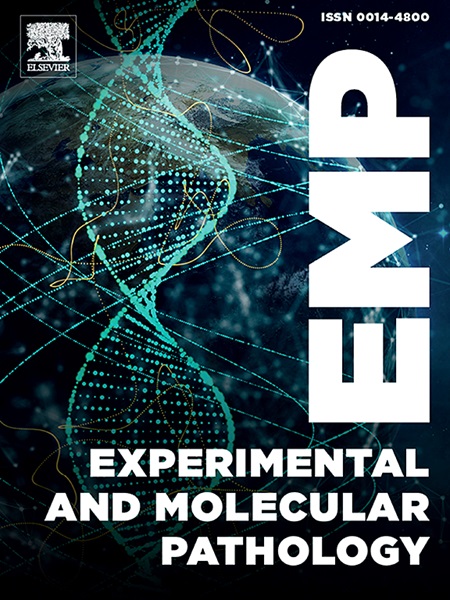基质金属蛋白酶-3是前列腺癌细胞增殖和迁移的重要预后因子
IF 3.7
4区 医学
Q2 PATHOLOGY
引用次数: 0
摘要
前列腺癌是全球男性常见的恶性肿瘤,探索新的生物标志物来改善其治疗是至关重要的。前列腺癌细胞通常侵入周围基质,细胞外基质(ECM)的重塑是前列腺癌发展的关键步骤。基质金属蛋白酶-3 (MMP3)是一种降解几种ECM成分的酶,与人类恶性肿瘤有关。然而,MMP3的临床和生物学意义尚未得到很好的阐明。因此,我们在前列腺癌组织中免疫定位了MMP3 (n = 117),并证明MMP3的免疫反应性与前列腺癌的侵袭性表型相关,包括更高的增殖/侵袭能力和更短的无病生存期。此外,随后的体外分析显示,MMP3的过表达显著增加PC-3和DU-145前列腺癌细胞系的增殖和迁移能力,依赖于WMPY-1前列腺基质细胞的条件培养基。由此得出结论,MMP3可能通过改变前列腺癌细胞周围的ECM而促进前列腺癌的进展,并可能作为前列腺癌的一个强有力的预后因素。本文章由计算机程序翻译,如有差异,请以英文原文为准。
Matrix metalloproteinase-3 is a potent prognostic factor associated with cell proliferation and migration in prostate cancer
Prostate cancer is a common malignancy in men around the world, and it is crucial to explore novel biomarkers to improve its treatment. Prostate cancer cells typically invade the surrounding stroma, and remodeling of the extracellular matrix (ECM) is a crucial step in the progress of prostate cancer. Matrix metalloproteinase-3 (MMP3) is an enzyme that degrades several ECM components and is implicated in human malignancies. However, the clinical and biological significance of MMP3 has not been well elucidated.
We therefore immunolocalized MMP3 in prostate cancer tissues (n = 117) and demonstrated that MMP3 immunoreactivity was correlated with aggressive phenotype of prostate cancer, including higher proliferation/invasion ability, and shorter disease-free survival. In addition, subsequent in vitro analysis revealed that overexpression of MMP3 significantly increased the proliferative and migratory abilities of PC-3 and DU-145 prostate cancer cell lines, depending on conditioned media from WMPY-1 prostate stromal cells.
It was concluded that MMP3 might contribute to prostate cancer progression by modifying the ECM surrounding prostate cancer cells and could serve as a potent prognostic factor in prostate cancer.
求助全文
通过发布文献求助,成功后即可免费获取论文全文。
去求助
来源期刊
CiteScore
8.90
自引率
0.00%
发文量
78
审稿时长
11.5 weeks
期刊介绍:
Under new editorial leadership, Experimental and Molecular Pathology presents original articles on disease processes in relation to structural and biochemical alterations in mammalian tissues and fluids and on the application of newer techniques of molecular biology to problems of pathology in humans and other animals. The journal also publishes selected interpretive synthesis reviews by bench level investigators working at the "cutting edge" of contemporary research in pathology. In addition, special thematic issues present original research reports that unravel some of Nature''s most jealously guarded secrets on the pathologic basis of disease.
Research Areas include: Stem cells; Neoangiogenesis; Molecular diagnostics; Polymerase chain reaction; In situ hybridization; DNA sequencing; Cell receptors; Carcinogenesis; Pathobiology of neoplasia; Complex infectious diseases; Transplantation; Cytokines; Flow cytomeric analysis; Inflammation; Cellular injury; Immunology and hypersensitivity; Athersclerosis.

 求助内容:
求助内容: 应助结果提醒方式:
应助结果提醒方式:


